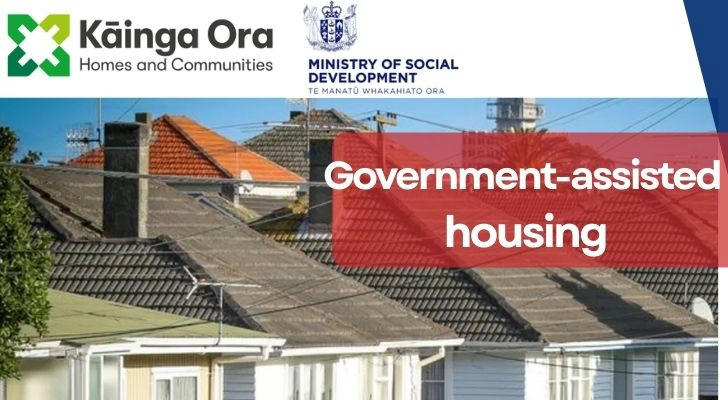Apply for Government-Funded Housing in New Zealand: Affordable Options for Low-Income Families
Finding stable and affordable housing is a challenge in New Zealand, especially for families with children, seniors, and low-income individuals. To address this, the New Zealand government funds several housing programs designed to make rent affordable and ensure access to safe homes.

🏡 What Is Government-Assisted Housing in New Zealand?
Government-assisted housing in New Zealand is mainly delivered through Kāinga Ora – Homes and Communities, a public agency that manages thousands of rental homes nationwide. Rent is income-based, ensuring affordability for those who need it most.
Major Housing Support Programs
| Program Name | Description |
|---|---|
| Public Housing (Kāinga Ora) | Government-owned homes rented at Income-Related Rent Subsidy (IRRS) rates, usually capped at 25% of household income. Priority is given to urgent cases. |
| Transitional Housing | Short-term housing for people experiencing homelessness, combined with social support services while waiting for a permanent home. |
| Emergency Housing Grants | Temporary funding for accommodation such as motels, provided through the Ministry of Social Development (MSD) in urgent cases. |
| Community Housing Providers (CHPs) | Nonprofit organizations offering affordable rental homes, sometimes with wrap-around support for vulnerable groups. |
📌 Real-Life Example: Sarah’s Housing Journey
Sarah, a 38-year-old mother of two in Auckland, lost her job during the pandemic. Unable to keep up with private rent of $520 per week, she applied for public housing through Kāinga Ora.
After three months in transitional housing, she was offered a two-bedroom Kāinga Ora unit. Thanks to the IRRS, her rent was reduced to $180 per week—just 25% of her income—allowing her to stabilize her finances and focus on returning to work.
👥 Who Is Eligible?
Eligibility depends on several factors, managed by MSD:
| Requirement | Details |
|---|---|
| Income & Assets | Must fall below set income and asset thresholds. |
| Residency | Must be a New Zealand citizen or permanent resident. |
| Housing Need | Priority for the homeless, overcrowded, or those in unsafe housing. |
| Special Needs | Families with children, elderly, or disabled members may be prioritized. |
🖥️ Housing Application Process
- Contact Work and Income (MSD): Start by registering your housing need.
- Assessment: MSD reviews income, assets, and urgency.
- Waitlist Placement: Approved applicants join the Social Housing Register.
- Housing Offer: Kāinga Ora or a Community Housing Provider contacts applicants when a suitable home becomes available.
⚠️ Note: Wait times vary by region, with longer waits in Auckland and Wellington.
💡 Why Apply for Public Housing in New Zealand?
- Rent Based on Income: Pay no more than 25% of income under IRRS.
- Access to Support Services: Transitional housing includes case management and social worker support.
- Security and Stability: Tenancies are long-term if obligations are met.
- Safety Standards: Government ensures houses meet healthy home requirements (heating, insulation, ventilation).
📎 Tips for Applying
- Register early with MSD to secure a place on the waitlist.
- Keep documents updated—income statements, IDs, and proof of housing need.
- Stay in contact with MSD and Kāinga Ora to avoid missing housing offers.
- Explore both public and community housing to widen your options.
✅ Final Thoughts
Public housing in New Zealand offers struggling families a pathway to safe, stable, and affordable homes. With rent linked to income and extra support available, these programs are designed to break the cycle of housing stress.
If you or someone you know is facing housing difficulties, don’t wait—contact MSD and explore Kāinga Ora housing today. Affordable housing is about dignity and opportunity, not just shelter.
